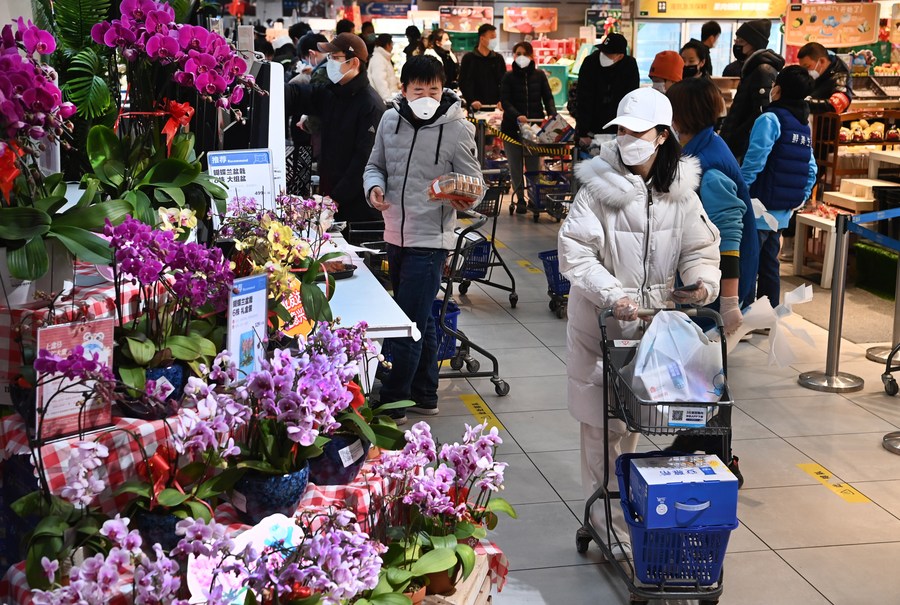
China's inflation was further tamed in January as food prices saw a decline, while price retreats in coal and steel sectors prompted factory-gate inflation to moderate, official data showed Wednesday.

Residents shop at a supermarket in Qujiang New District of Xi'an, northwest China's Shaanxi Province, Jan. 15, 2022. (Xinhua/Tao Ming)
The consumer price index (CPI), a main gauge of inflation, rose 0.9 percent year on year in January, down from the 1.5-percent increase a month ago, data from the National Bureau of Statistics (NBS) showed.
A breakdown of the data showed that food prices dropped 3.8 percent year on year, a decline 2.6 percentage points higher than that in December 2021.
The price of pork, a staple meat in China, slumped 41.6 percent year on year, compared with a 36.7-percent decrease a month ago.
The price retreat of pork came due to a high base of comparison in the same period last year, noted NBS senior statistician Dong Lijuan.
Non-food prices rose 2 percent from a year earlier, which eased from the 2.1-percent increase reported in the previous month.
The core CPI, which excludes food and energy prices, gained 1.2 percent year on year, flat with a month ago.
On a monthly basis, the country's CPI rose 0.4 percent, with food prices increasing by 1.4 percent.
Due to the Spring Festival holiday, fruits, aquatic products and vegetables saw price increases, going up 7.2 percent, 4.1 percent and 3.1 percent from the previous month, respectively, Dong said.
The prices of gasoline and diesel rose 2.2 percent and 2.4 percent month on month, due to the impact of rising global energy prices.
Wednesday's data also showed that China's producer price index (PPI), which measures costs for goods at the factory gate, recorded a further slowdown in growth in January over sustained government efforts to stabilize energy and raw material prices.
The PPI went up 9.1 percent year on year in January, which moderated from the 10.3 percent year-on-year increase registered in December last year. On a monthly basis, the PPI dropped 0.2 percent last month.
Falling coal and steel prices, as a result of government measures to ensure supply and stabilize prices, have led to an overall price decline among industrial products in January, Dong said.
However, price hikes in the global markets shored up domestic producer prices in oil and non-ferrous metal industries.
Inflation is a prominent issue facing the world, and China must pay close attention to its potential spillovers, according to a State Council executive meeting chaired by Chinese Premier Li Keqiang on Monday.
"We are confident and capable of tackling inflation, but we must stay on alert," Li said at the meeting. "Should inflation occur, it would cause a major impact on the society. Therefore it is crucial to ensure supply and keep prices stable."
Efforts to ensure the supply and stable prices of commodities will continue, to ease cost-induced pressures on downstream enterprises and keep consumer prices generally stable, Li noted.